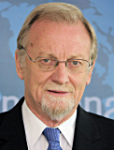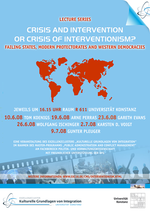Short Biographies
Gareth Evans

Gareth Evans has been since January 2000 President of the Brussels-based International Crisis Group, the independent global NGO working on five continents to prevent and resolve deadly conflict.
He came to Crisis Group after 21 years in Australian politics, thirteen of them as a Cabinet Minister. As Foreign Minister (1988-1996) he was best known internationally for his role in developing the UN peace plan for Cambodia, helping conclude the Chemical Weapons Convention, and helping initiate new Asia Pacific regional economic and security architecture.
He has written or edited eight books – including Cooperating for Peace, launched at the UN in 1993 – and has published over 90 journal articles and chapters on foreign relations, human rights and legal and constitutional reform. He was Co-Chair of the International Commission on Intervention and State Sovereignty, which published its report, The Responsibility to Protect, in December 2001; and a member and co-author of the reports of the UN Secretary General’s High Level Panel on Threats, Challenges and Change (December 2004), the Blix Commission on Weapons of Mass Destruction (June 2006), and the Zedillo International Task Force on Global Public Goods (September 2006). He is currently a member of the UN Secretary-General's Advisory Committee on Genocide Prevention.
Wolfgang Ischinger
Ambassador Ischinger is the new chairman of the Munich Conference on Security Policy. Since May 2008 he has also taken over as a chief representative directing Allianz SE’s newly created division of Politics and External Relations.
From 2006 to 2008 he was the Ambassador of the Federal Republic of Germany to London. For nearly five years previous to that, he was the German Ambassador to the US and from 1998 to 2001 State Secretary in the Foreign Ministry. In 2007 he was also the European Union’s representative to the Troika negotiations on Kosovo.
Ischinger studied law at the Universities of Bonn and Geneva, then international law, international trade relations and contemporary history at the Fletcher School of Law and Diplomacy and Harvard Law School (Cambridge, USA).
From 1973 to 1975, he was member of the cabinet of the UN Secretary-General in New York. In 1975 he entered the foreign service of the Federal Republic of Germany. He subsequently served in the planning staff at the Foreign Ministry and at the Embassy in Washington, where he specialized in security policy. From 1982 to 1990, he was on the personal staff of the Foreign Minister, first as a private adviser, and after 1987 as the director of the Foreign Ministry’s Department for Parliamentary and Cabinet Affairs.
In 1990 he was appointed an envoy and director of the Political Department in the German Embassy in Paris. In 1993 he was promoted to Head of the Planning Staff in the Foreign Ministry. In 1995, he was Chief Director of the Political Department in the Foreign Ministry (“Political Director”). In this capacity, he also served as Director of the German Delegation to the Bosnian peace negotiations in Dayton, Ohio in 1995, to the NATO/Russia negotiations in 1996-97, and in the Kosovo crisis of 1998-99. In October 1998, he was appointed State Secretary in the Foreign Ministry.
Tom Koenigs
Tom Koenigs was appointed by United Nations Secretary-General as his Special Representative in Afghanistan (2006-2007). Previously, he was Human Rights Envoy of the Federal Government of Germany (2005-2006) after serving as UN Special Representative in Guatemala and Deputy Special Representative of the UN Secretary-General in Kosovo.
From 1993 to 1997 Koenigs was City Treasurer of Frankfurt am Main and from 1989 to 1999 Director of the Environmental Department of Frankfurt as well.
Arne Perras
Arne Perras, a journalist with a doctorate in history (Oxford), has been since 2006 the African correspondent for the Süddeutsche Zeitung in the Kampala (Uganda) office.
Previously he worked as a freelance writer in Tanzania, Indonesia and in the Balkans. He was also political editor of the Nürnberger Nachrichten and their parliamentary correspondent. From 2000 to 2006 he was one of the foreign editors of the Süddeutsche Zeitung.
Perras is author of the book, Carl Peters and German Imperialism, 1856 to 1918: A Political Biography (Oxford University Press, 2004).
Gunter Pleuger
Gunter Pleuger studied law in Bonn and Cologne as well as political science at the École Nationale d'Administration in Paris.
In 1969 he joined the Foreign Service and worked from 1970 to 1974 at the German delegation to the United Nations in New York. After various other stations (including New Delhi and Washington) and after being head of the Foreign Ministry’s UN Department, he worked after 1998 as Political Director and as of 1999 as State Secretary in the Foreign Ministry.
From 2002 to 2006, he served as Ambassador of the Permanent Mission of Germany at the United Nations in New York and represented Germany in 2003 and 2004 in the Security Council.
Karsten D. Voigt
Karsten D. Voigt has been since 1999 the Coordinator for German-American Cooperation in the Foreign Ministry.
He studied history, German, and Scandinavian studies in Hamburg and Frankfurt.
From 1969 to 1973 he was chairman of the Young Socialists in Germany. He was a member of the SPD Executive Committee from 1984 to 1995, and a board member of the Social Democratic Party of Europe from 1985 to 1994. Between 1976 and 1998, he was a member of the Bundestag and from 1977 to 1998, a member of the Parliamentary Assembly of NATO, which he presided over from 1994 to 1996. He is one of the leading German experts on matters of foreign and security policy. From 1983 to 1998, he was a Foreign Policy Spokesman of the SPD parliamentary group. In January 1999 he took over the post of Coordinator of German-American Cooperation.
Among his numerous other political functions are his memberships in: the Presidium of the German Society for Foreign Policy (DGAP), the Board of Trustees of the Aspen Institute, the international scientific advisory board of the Allied Museum of Berlin (Chairman) as well as the advisory committees of the Graduate School of North American Studies at the Free University of Berlin, the Center for German and European Studies at the University of Minnesota, and the Center for International Governance Innovation in Waterloo, Canada.

